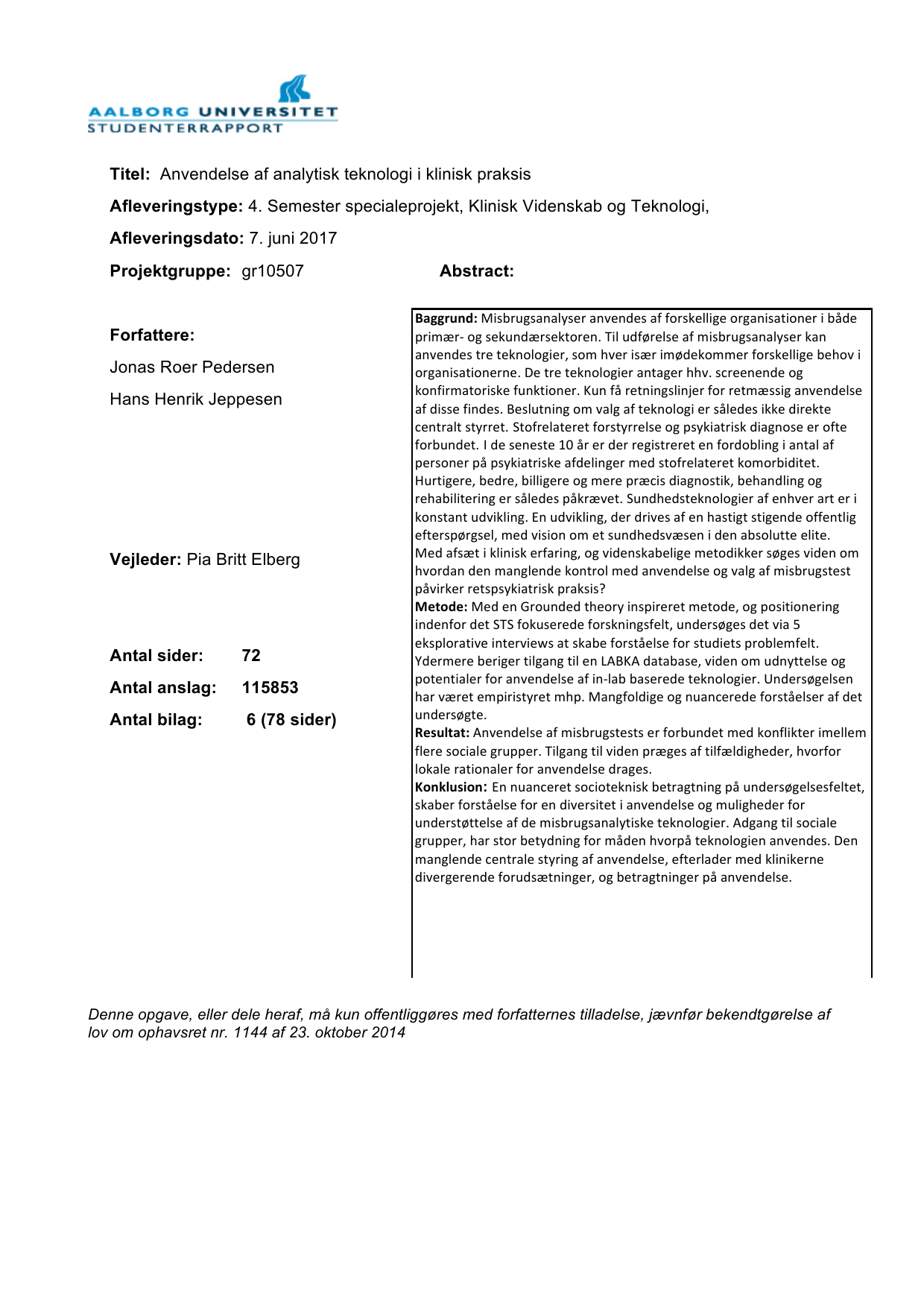
Anvendelse af analytisk teknologi i klinisk praksis
Oversat titel
Use of analytical technology in clinical practice
Forfattere
Semester
4. semester
Udgivelsesår
2017
Afleveret
2017-06-07
Antal sider
77
Abstract
Baggrund: Misbrugsanalyser anvendes af forskellige organisationer i både primær- og sekundærsektoren. Til udførelse af misbrugsanalyser kan anvendes tre teknologier, som hver især imødekommer forskellige behov i organisationerne. De tre teknologier antager hhv. screenende og konfirmatoriske funktioner. Kun få retningslinjer for retmæssig anvendelse af disse findes. Beslutning om valg af teknologi er således ikke direkte centralt styrret. Stofrelateret forstyrrelse og psykiatrisk diagnose er ofte forbundet. I de seneste 10 år er der registreret en fordobling i antal af personer på psykiatriske afdelinger med stofrelateret komorbiditet. Hurtigere, bedre, billigere og mere præcis diagnostik, behandling og rehabilitering er således påkrævet. Sundhedsteknologier af enhver art er i konstant udvikling. En udvikling, der drives af en hastigt stigende offentlig efterspørgsel, med vision om et sundhedsvæsen i den absolutte elite. Med afsæt i klinisk erfaring, og videnskabelige metodikker søges viden om hvordan den manglende kontrol med anvendelse og valg af misbrugstest påvirker retspsykiatrisk praksis? Metode: Med en Grounded theory inspireret metode, og positionering indenfor det STS fokuserede forskningsfelt, undersøges det via 5 eksplorative interviews at skabe forståelse for studiets problemfelt. Ydermere beriger tilgang til en LABKA database, viden om udnyttelse og potentialer for anvendelse af in-lab baserede teknologier. Undersøgelsen har været empiristyret mhp. Mangfoldige og nuancerede forståelser af det undersøgte. Resultat: Anvendelse af misbrugstests er forbundet med konflikter imellem flere sociale grupper. Tilgang til viden præges af tilfældigheder, hvorfor lokale rationaler for anvendelse drages. Konklusion: En nuanceret socioteknisk betragtning på undersøgelsesfeltet, skaber forståelse for en diversitet i anvendelse og muligheder for understøttelse af de misbrugsanalytiske teknologier. Adgang til sociale grupper, har stor betydning for måden hvorpå teknologien anvendes. Den manglende centrale styring af anvendelse, efterlader med klinikerne divergerende forudsætninger, og betragtninger på anvendelse.
Back ground: Tests for substance abuse are used by a variety of organisations in both the primary and secondary sectors. Three technologies can be applied in the process of testing for drug abuse, each technology accommodating different requirements in the organisation. The three technologies assume screening and confirmatory functions. Only very few guidelines for the lawful use of these (technologies) are available. Decisions on the choice of technology applied are thus not directly centrally controlled. Drug related disorders and psychiatric diagnosis are often associated. Over the last 10 years the number of patients admitted to psychiatric wards with drug-related comorbidity has doubled. Faster, better, cheaper and more accurate diagnostics, treatment and rehabilitation are therefore required. Health technologies of all kinds are constantly evolving. A development driven by a rapid increase in demand from a public sector, with a vision of a health service in the absolute elite. Based on our clinical experience, and scientific methodologies, knowledge is sought to determine how the lack of centralised control in the choice and application of drug of abuse testing methods affects the forensic psychiatry practice? Method: With a grounded theory-inspired method and positioning within the STS focused research field, analysis are made through 5 exploratory interviews to create an understanding of the study's problem field. Furthermore, access to a LABKA database adds insight and knowledge of utilization and the potentials for using in-lab based technologies. The survey has been lead by an empirical method to obtain expansiveand nuanced understandings of the investigated subject area. Result: The use of substance abuse tests is associated with conflicts between several social groups. The access to knowledge is characterised by irregularity, from where local rationales for application are drawn. Conclusion: A nuanced sociotechnical point of view in the field of research, creates an understanding of diversity in the application and the possibilities of supporting the analytical technologies. Access to social groups has a significant impact on the way in which technology is applied. The lack of central management of use leaves the clinics diverging assumptions and considerations of use.
Emneord
